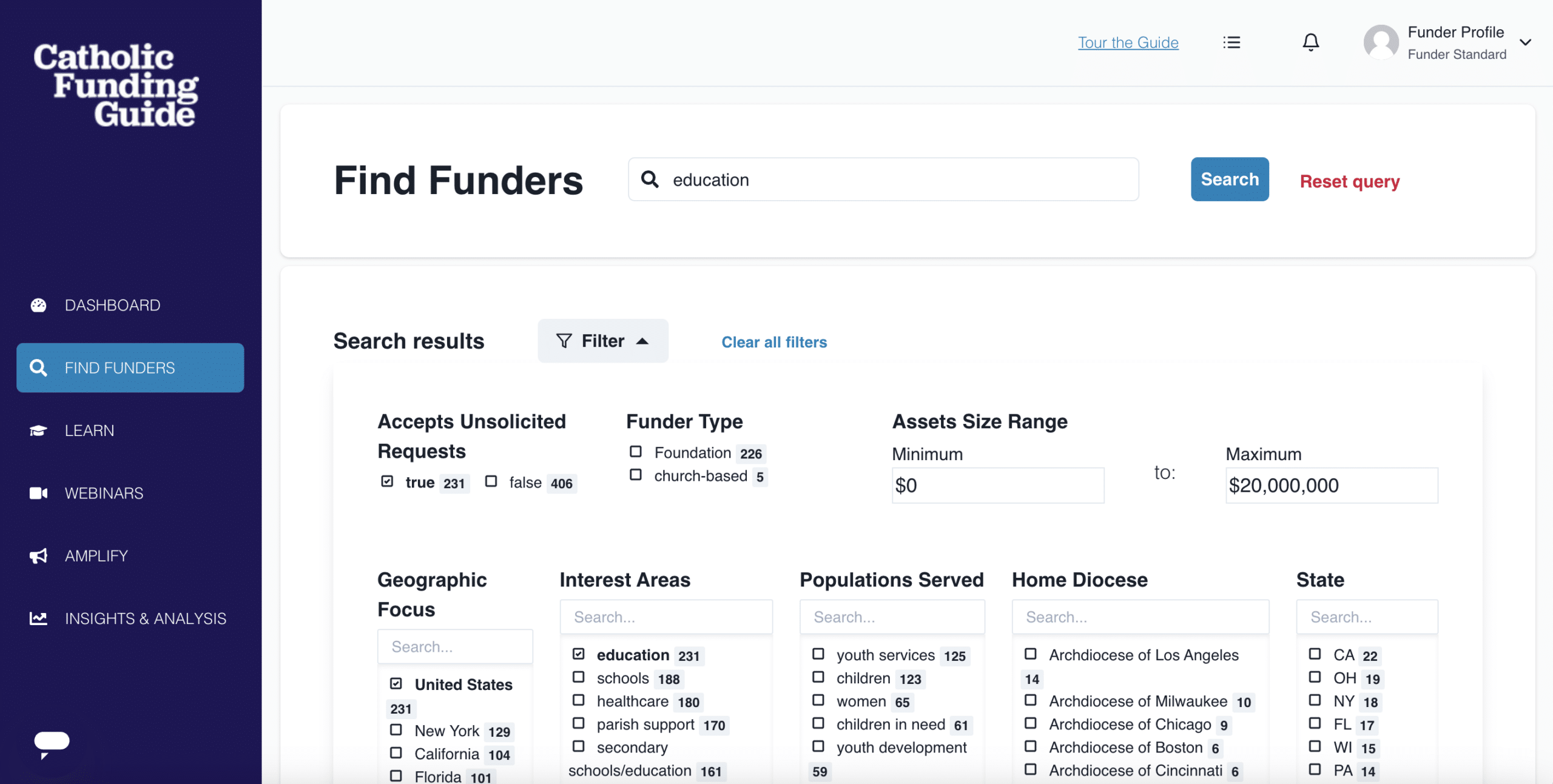Where All Funding Should Start: Budget & Financial Planning
Funders are more willing to invest in a financially responsible organization. This is why any fundraising plan must be preceded by an established budget and thoughtful financial planning.
Your development team and finance committee should be on the same page. Anyone who contributes to the school’s fundraising plan should first have a clear understanding of the school’s financial situation.
Points of consideration should include:
- Overall financial state of the school
- Specific projects or initiatives in need of funding
- Cost of everyday operations
- Projected enrollment
- Retention rate
- Any recent decisions or changes that will impact budget and finances
- Median income of families in the community and those attending the school
- Any ongoing or upcoming technology upgrades, building improvements, or expansions
“Achieving Fiscal Resilience,” a blog post from The Healey Foundation, discusses the importance of a finance committee that will identify and resolve financial issues. The post states:
“A fiscally resilient school measures, benchmarks and manages its revenue streams for long-term sustainability.”
The key idea here is “long-term sustainability.” While a finance council should provide clarity on issues the school is facing today, they also should provide insights into what the school may be facing tomorrow. Work with your finance council to determine needs and a realistic goal based on key projections.
In All Your Fundraising, Trust God
It is true that stress and worry often accompany fundraising efforts, especially when a situation appears to have no obvious solution and the stakes are high. At the same time, as Catholics, we have the privilege to turn to God in our struggles, to trust that He will provide. While difficult, fundraising presents a beautiful opportunity to trust.
In the words of Henri Nouwen:
“What is our security base? God or Mammon? That is what Jesus would ask. He says that we cannot put our security in God and also in money. We have to make a choice. Jesus counsels: ‘Put your security in God.’ We have to make a choice where we want to belong, to the world or to God. Our trust, our basic trust, Jesus teaches, has to be in God. As long as our real trust is in money, we cannot be true members of the Kingdom.” (Our Security Base)
Read more spiritual insights on fundraising from Henri Nouwen.
Fundraising Ideas for Your Catholic School
You can think of fundraising in two tiers. There is the institutional tier and the grassroots tier. Both are often vital sources of funding for the success of a Catholic school.
Major Donors & Institutional Fundraising
Start local.
Local foundations such as Catholic community foundations or Catholic education foundations are a great place to start in your search for funds. You can actually find Catholic funders in your area using The Catholic Funding Guide.
Some foundations offer endowments and grants specifically for scholarships; if students are struggling to afford tuition, this can be a great option to explore.
Some donors establish donor-advised funds at foundations. These are growing in popularity. Local foundations can give you more information about the options available. They may even be able to connect you with individual donors and investors who have demonstrated an interest in supporting Catholic schools and education programs in your area.
Engage in community networking.
A successful Catholic school has a strong community presence. Whether fundraising or seeking to add value in your community through an outreach or school program, you’ll cultivate meaningful relationships that support long-term success when you attend community events, visit parishes, and partner with Catholic organizations.
Funders often consider how an organization partners with other organizations in the community. Some may be more inclined to fund schools that actively collaborate with other schools or local organizations. Collaborations offer funders the opportunity to make a broader impact with their gift, reaching beyond the walls of your school and into the community.
Apply for grants.
Of course, grants remain a classic way to win funding, but it’s important to plan ahead of time to find grants, read qualifications, and meet deadlines for submission. All of that is a time-consuming process, so start early.
Make sure you brush up on your skills to write an effective letter of inquiry and avoid common grant writing mistakes.
Grassroots Fundraising
Hosting a fundraising event is a great way to engage the community with your school while giving them an experience to remember. To plant seeds of personal encounter, have students, teachers, and other staff volunteer to work at the events, giving them the chance to connect with the community.
Event ideas:
- Cook off
- Dinner
- Bake sale
- Raffle – tickets, baskets, etc.
- Picnic or barbecue
- Dance or music-themed event
- Car wash or car show
- 5K run / walk
- Flower sale
- Soup sale
- Restaurant fundraiser – restaurant agrees to donate a percentage of proceeds within a specific time frame
- Trivia night
- Box tops
- Gala
- Student & alumni talent show
In selecting and planning your event, the following points are important factors to consider:
- The ways you will market the event – online, social, flyers, announcements, email invitations, mail invitations, etc.
- The upfront costs of the event
- The expected ROI
- The time commitment of staff, volunteers, students, etc.
In addition to hosting an event, there are some elements of your overall strategy that you can keep in mind for a successful year:
- Thoughtfully timed letters and emails, especially for your year-end appeal
- Videos and handwritten cards and pictures from students
- Use social media to drive awareness
- Make the campaign easy to find on your website
Common Funding Challenges for Catholic Schools
There are many challenges to fundraising, and in many ways the changing landscape due to Covid has made some challenges more prominent.
Common challenges you may be facing:
Competitive industry.
Fundraising, whether in Catholic education or otherwise, tends to be competitive. The best way to counter this is by using personal, highly targeted communications and heartfelt messages in your campaigns.
Competitive priorities.
Working in a Catholic school, you are pulled in many different directions, especially if you have a smaller staff or you’re the only one in your department. You may wonder if allotting time to a fundraising campaign is even worth it when there are more pressing issues to deal with such as dropping retention, recruitment concerns, or even looming debt that threatens to shut down the school.
However, designating some focus on fundraising and networking with funders might just be the best way to find a solution. You can also involve the board, finance committee, and leadership team in your fundraising discussions. These other individuals may offer fresh perspectives and ideas that can infuse some much-needed energy and direction into your efforts.
Having a lot of capital-related needs such as building costs and salaries.
For schools in need of funding for operating costs and building improvements, finding a grant is difficult because many foundations will not fund operations. The best way to move past this roadblock is to get creative. Collaborate with other organizations that could alleviate some expenses; run a campaign specifically for operating costs; use The Catholic Funding Guide to locate funders who may consider providing the support you need.
GHR Foundation provides a great example of a creative solution that was used to save a failing school just before they shut their doors. We discuss it in this blog post; and you can also read the case study.
Tips for Catholic School Fundraising Success
Arguably the number one rule of fundraising: make your communication efforts as personal as possible. Here are four ways to do that.
- Get students involved in fundraising efforts and have them establish a personal connection with potential donors and existing donors and foundations. Current students should engage with alumni as well.
This point is beautifully illustrated in this blog post from The Healey Foundation entitled “Annual Fund: Connecting with the Willingness to Give”:
“Mailings to constituents have also worked well for Our Lady of Mount Carmel Regional School (Berlin, NJ), according to Melissa Chesebro, Advancement Director. ‘A student-designed Christmas card with a donor envelope enclosed was one of our more successful tactics last year,’ she said. ‘We’ve learned to rely on current students to draw in and connect with our alumni.’”
- Get your parish involved in your efforts. Ask the pastor to talk about your school and invite parishioners to give. This worked well for Saint Katherine of Siena Grade School, as detailed in “Annual Fund: Connecting with the Willingness to Give”:
“After raising $20,000 in its first Annual Fund, Saint Katherine of Siena Grade School (Philadelphia, PA) surpassed its goal in year two to reach $60,000. Nearly half that amount was from the parish through a special Lenten collection, endorsed by the pastor who advised on how to implement for the best possible results.
‘Our main concern was to do this in a way that was not overbearing for parishioners who already contribute in so many ways,’ said Erin McShea, Advancement Director, Saint Katherine of Siena Grade School (Philadelphia, PA).
‘We sent a letter to make a case and offered the ability for people to mail their contribution or bring an envelope to church. They responded generously, making this so much more than just another second collection where they dropped dollar bills in a basket.’
- Always demonstrate impact not just in students’ lives, but also for parents, teachers, staff, and the broader community. One way to do this is by showcasing powerful alumni and student success stories. Another is to cultivate the school’s relationships with community organizations doing good work. Funders are often glad to see collaboration between complementary organizations.
- Pray for donors and potential donors. It can be powerful for both students and donors when the school collectively prays for those who support them!
Additionally, here are some vital steps you can take to set your development efforts up for success.
- Take an objective look at what’s working and what isn’t, and don’t be afraid to get creative. Be bold and try something new. Stop doing what isn’t working in an effort to discover what will.
- Be aware of donor fatigue, which can have a harmful impact on regular support.
- Get the board involved in fundraising discussions. It is also immensely helpful to have a diverse board. When you have multiple perspectives weighing in, the creative potential is vast.
- Be honest with funders about the financial needs of your school; consider running a fundraising campaign or program specifically for operations or scholarships for students who may be leaving the school due to tuition costs.
One final note: in all your fundraising efforts, turn to God in prayer. He will guide you to the best decision and the answers you seek.



